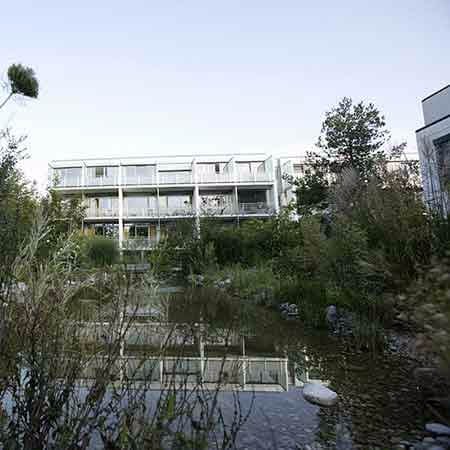Cancer of the bladder neck, including the general notion of bladder cancer, has recently become a widespread problem in urology. Cancer of the bladder neck is a malignant tumor formed in the neck of the bladder. At the advanced stages, it affects the organs located both in its immediate vicinity (prostate, uterus, urethra, rectum) and more distant ones (lungs, liver, bones).
Content
- What’s important to know about bladder cancer treatment?
- Risk factors of cancer of the bladder neck
- Symptoms of cancer of the bladder neck
- Options for bladder cancer treatment in Germany
- Radiation therapy for cancer of the bladder neck
- Treatment tactics depending on the stage of bladder cancer
- The prognosis for patients with cancer of the bladder neck
- The cost of treatment in Germany
- Bladder cancer treatment in Germany with Booking Health
What’s important to know about bladder cancer treatment?
First of all, the disease is almost completely asymptomatic for a long time and is often detected at an advanced stage, when the bladder neck or the bladder itself has to be removed. Secondly, the disease is often recurrent: on average, one patient undergoes three to five different treatment courses. Recovery may be very long and painful, it takes half a year on average. Despite all the difficulties, it's important to remember what it's all about – a chance for a longer and better life.
For bladder cancer treatment in Germany, physicians at German hospitals perform minimally invasive endoscopic surgeries, without large incisions. And even the removal of the bladder is no reason for despair: physicians can remove the organ and replace it with an artificial bladder, made of a patient's small intestine. An artificial bladder is sutured to the urethra and functions like a normal one. As a result, people go to the toilet themselves, no tubes and bags of urinary trays are required. After recovery, a person lives almost as before. Such surgeries in German hospitals are also performed laparoscopically, without large incisions.
Yes, these operations are quite rare and technically complicated, but it is very important to talk about them. People should know that a disease that sounds like a verdict is not a verdict. The pathology can be successfully treated with radical approach, and patients treated with it can return to an active life afterward.
Risk factors of cancer of the bladder neck
Smoking has been proven to be a major risk factor for bladder cancer. Tobacco smoke contains thousands of chemical compounds that have a carcinogenic effect on our bodies.
An increased risk of bladder cancer is present in some industrial jobs. In industries such as the textile, paint, or chemical industry, bladder cancer is considered an occupational disease. Organic compounds used to produce dyes, pharmaceuticals, and many other products, also cause bladder cell mutations. It should be noted that it can take many years before the oncological pathology manifests itself with complaints.
In addition, intake of certain medications can increase the risk of bladder cancer.
Radiation exposure due to radiation therapy can also cause bladder cancer. Additional risk factors are chronic inflammatory diseases of the bladder mucosa. These include chronic cystitis, urolithiasis, urinary retention, or constant urinary catheter use.
Symptoms of cancer of the bladder neck
The most common symptom of both bladder cancer and cancer of the bladder neck is a change in the color of the urine, which has a reddish-brown color due to the presence of blood.
The next symptoms of bladder cancer may be frequent urges to urinate, with only small amounts of urine being excreted. As the disease progresses, urination becomes difficult and usually painful. Pain in the lower abdomen, weakness, and anemia occur.
The advanced stage of the disease is accompanied by pain in the side and inguinal area, increased lymph nodes, and bone pain.
However, these complaints may indicate not only cancer but also other pathological changes in the urinary tract and kidneys. Also, urinary blood can appear due to inflammation of the bladder. Therefore, if such symptoms occur, you should see a doctor immediately to detect the problem on time.
Options for bladder cancer treatment in Germany
At the early stages of bladder cancer, when tumor spread is limited to the epithelial layer, transurethral resection followed by intravesical chemotherapy or immunotherapy in the form of injection of drugs into the bladder cavity is indicated. The advantage of intravesical drug injection is the absence of side effects of systemic chemotherapy, such as nausea, vomiting, and hair loss.
A more modern method of immunotherapy is the use of checkpoint inhibitor drugs. Checkpoints are molecules that suppress the immune response mostly to prevent the onset of autoimmune diseases. Inhibitors remove the block of these points and stimulate the immune system to fight the cancer cells.
Laser resection is another low-traumatic method of treatment, which allows removing a neoplasm in the mucosa, submucosa, and muscle layer in a single block. This method is not suitable for large masses without clear boundaries.
At advanced stages, with an extensive spread of the process the complete removal of the organ, i.e. cystectomy, is performed, followed by radiation therapy or chemotherapy. Isolated removal of the bladder for invasive cancer is rarely performed. More often, it is combined with the removal of adjacent tissues and organs. The entire urethra or its part, pelvic lymph nodes are resected at the same time.
After cystectomy, it is possible to perform a reconstructive surgery, i.e. neocystoplasty, when the removed bladder is replaced by an isolated section of the intestine, to which ureters and urethra are connected.
Radiation therapy for cancer of the bladder neck
Patients with early-stage invasive bladder cancer may undergo radiation therapy in order to avoid the need for surgery. In the case of recurrence, the surgery is indicated in most cases.
Radiation therapy may be prescribed:
- Before surgery or chemotherapy to shrink the tumor (neoadjuvant therapy)
- After the complete removal of the tumor to prevent a recurrence (adjuvant therapy)
- In combination with chemotherapy for the treatment for patients with stage second or third disease, or recurrent cancer
- In combination with chemotherapy as initial treatment for patients with stage 2-3 bladder cancer to preserve the organ
- To reduce symptoms of cancer, such as pain, to improve the patient's quality of life
Approximately one in two patients receives radiation therapy during treatment of malignancy at stage 2 or 3. Radiotherapy instead of surgery can preserve the bladder. While cancer has not metastasized yet, many people have a chance for healing. The most important aim of radiotherapy is to cure cancer or delay its progression.
Radiation therapy for bladder cancer after transurethral resection in men and women is aimed at preventing recurrence. Radiation allows the lymph nodes affected by the tumor to be restored. The rate of metastasizing after radiation therapy is reduced to 23%, while the rate without radiation reaches 40-50%.
Treatment tactics depending on the stage of bladder cancer
Tactics of bladder cancer treatment in Germany is determined based on the results of the preliminary examination. The radicality of treatment procedures, in turn, depends on the stage of cancer.
For stage 1 non-invasive bladder cancer (when the neoplasm is localized only in one layer of the bladder wall), transurethral excision of the oncological focus and intravesical drug injections after surgical intervention are performed. The drug therapy is carried out on an outpatient basis for 6 weeks.
If the tumor spreads to the ureter indicating the second stage of cancer, and no metastases are found in the small pelvis, retrograde urinary pyelography and excision of the ureteral mass are performed to remove the bladder neoplasm. Depending on the level of damage, a part of the ureter is also dissected, followed by its plasty. If there is a risk of cancer cells spreading during the resection of the ureter, the physician at the urology department performs only the excision of the bladder tumor. After the surgery, cytostatics (intravesical chemotherapy) are administered for 6 weeks inside the bladder, and only then the resection of the mass in the ureter is repeated.
If the cancer of the bladder neck has invaded the bladder wall and there is a risk of its spreading to the pelvic lymph nodes, the patient undergoes transurethral excision of the neoplasm located in the bladder (intraoperative biopsy is mandatory). This is followed by 4-6 chemotherapy courses. Cytostatics are administered systemically on days 1 and 8 of the course.
If abnormal cells are found during the repeated examination, the surgeon performs a radical cystectomy with reconstructive plasty of the bladder from the small intestine.
The prognosis for patients with cancer of the bladder neck
The prognosis of survival depends on the degree of cancer progression and the completeness of treatment. If a neoplasm or single cancer cells are detected and surgery is performed together with chemotherapy or immunotherapy, the chances of recovery are about 91%.
At the second stage, without the spread of cancer to other organs, timely performed transurethral resection and chemotherapy (less often – radiotherapy) allow hoping for recovery without relapse in 73-75% of patients.
At the third stage and spreading of the process to the adjacent organs, even after removal of the bladder and chemotherapy, relapse is probable. The five-year survival rate is observed in 50% of patients.
At the fourth stage, the process is considered inoperable. The five-year survival rate is less than 7%.
The cost of treatment in Germany
The total cost of treatment in German hospitals depends on the number of diagnostic procedures, the degree of bladder invasion, the presence of metastases, and the treatment tactics chosen. Some patients require a long hospital stay, while others can start medication therapy at home.
Generally, the cost of treatment with transurethral resection starts at 9,209 EUR, the prices for diagnostics start at 886 EUR, and the prices for rehabilitation start at 951 EUR per day.
Contact Booking Health by filling out the request form on the website to find out the cost of treatment in German hospitals with the most common methods.
Bladder cancer treatment in Germany with Booking Health
Treatment in Germany under the guidance of Booking Health specialists involves staying in the leading German hospitals and medical centers. We will be happy to advise you on the possibilities of undergoing diagnostics and receiving medical care in Germany.
Booking Health offers you the full range of medical services that you can receive in Germany at a favorable price. With us, you get complete and up-to-date information on the possibilities of German medicine, urology, and treatment of cancer of the bladder neck in Germany in particular.
To get started, fill in the request form on the website, and a Booking Health specialist will accept your request for treatment and review your documents as quickly as possible.
Authors:
The article was edited by medical experts, board certified doctors Dr. Nadezhda Ivanisova and Dr. Sergey Pashchenko. For the treatment of the conditions referred to in the article, you must consult a doctor; the information in the article is not intended for self-medication!
Our editorial policy, which details our commitment to accuracy and transparency, is available here. Click this link to review our policies.
Sources:
National Library of Medicine
Sage Journals
Science Direct
















